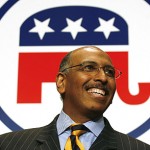By Michael Steele, on Mon May 26, 2014 at 10:00 AM ET 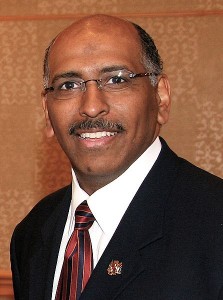 The untreatable international agita over Russia’s meddling in Eastern Ukraine is taking on otherworldly overtones here in the United States, where the Putin regime’s hegemonic bullying of its next-door neighbor is reaping unforeseen cosmic repercussions in the heavens, in the halls of diplomatic and military power, and in the courts. The untreatable international agita over Russia’s meddling in Eastern Ukraine is taking on otherworldly overtones here in the United States, where the Putin regime’s hegemonic bullying of its next-door neighbor is reaping unforeseen cosmic repercussions in the heavens, in the halls of diplomatic and military power, and in the courts.
Leave aside, for moment, the general concept of punishing sanctions, which haven’t hit hard enough to convince the willful Russians not mess with Ukraine. Forget, too, the internationally accepted and expected notion that sovereign nations should be left to set their own destinies. Insistence by pro-Russian separatists in Eastern Ukraine on moving forward with an intentionally provocative “self determination” referendum, and subsequent declarations of “independence” by the Donetsk and Lugansk regions, seem to all but assure that a deeper and perhaps bloodier conflict will soon engulf part or all of Ukraine.
In just days, roughly one third of Ukraine’s territory could effectively become a Soviet-style satellite. The current, minimalistic sanctions regime the Western powers have put in place has done nothing to stop the Russian power grab that is controlling the separatist movement from the Kremlin.
But aside from the immediate geopolitical price to be paid for indecisive Western reaction, there are other consequences to leading from behind. Here in the United States, satellites of quite another variety are becoming a new, central focus of the Ukraine crisis — our spy satellites.
Arguments abound in political, industrial, military and legal circles about the folly of the US defense sector’s reliance on Russian industry and technology to heft the Intelligence Community’s eyes on the world into low Earth orbit. You read that correctly — US surveillance satellites cannot attain their perches in the heavens without the aid and acquiescence of the Russians.
At particular issue here is the astonishing US reliance on Russian rocket engines for a longstanding heavy space launch program overseen by the US Air Force. Launches conducted by that program, known commonly as EELV, short for Evolved Expendable Launch Vehicle, have been sole-sourced to industrial behemoths Boeing and Lockheed Martin since the program’s inception in the mid-1990s.
In the years since the program’s founding, however, the relationship between those two rival firms and the US Government has grown quite cozy. Boeing and Lockheed Martin formed the consortium firm United Launch Alliance (ULA) in 2006, and since then, ULA has entrenched itself as the Air Force’s single source for heavy launches, most of which involve depositing “national security payloads,” or spy satellites, over troubled areas.
Other quite capable American firms have tried to enter this arena in recent years but have been rebuffed by any variety of unfair means.
ULA’s workhorse rocket is the Atlas V. The Atlas V is itself a fascinating historical artifact, designed by Lockheed Martin prior to the founding of ULA but after the Berlin Wall came down, the Soviet Union was thought to be vanquished, and Russian-American industrial and economic cooperation hit new, previously unimaginable heights.
At its core, the Atlas V was once looked upon as a symbol of US-Russian goodwill and technical collaboration. Those were different times, indeed.
The first Atlas V lifted off in 2002, soaring into the skies under the power of the Russian-designed-and-built RD-180 rocket engine, which still powers this mainstay even today. No Atlas V leaves a launch pad without at least one RD-180 attached to it. The rocket simply isn’t designed to accommodate anything else.
This means exactly what you have just deduced – the US intelligence agencies that need ULA’s services, not to mention the other government entities that launch their own machinery into space, are at the mercy of the Russian Federation. By its own admission, ULA has only two years’ worth of RD-180s in its stockpiles. That’s it. Either ULA will have to buy a whole bunch of rocket engines from the Russians before sanctions for Russia’s Ukraine misadventure are expanded, (at outrageously inflated prices, one would think), or the EELV program grinds to a halt in short order.
While some US firms like Space Exploration Technologies (SpaceX) have challenged ULA’s monopolistic hold on the EELV program, others are looking more specifically at the reliance on the RD-180 and don’t like what they see. One of these is Sen. John McCain, who has taken up the laboring oar to assure that competition in the launch market frees the United States from this bizarre and inexplicable dependency.
Current US sanctions against Russia for annexing Crimea and for further agitation throughout Ukraine’s East single out select individuals close to the Kremlin’s power structure. One of these figures is the man that oversees the Russian aeronautics firm that manufactures the RD-180. A federal contracts court based in Washington just this last week found itself grappling with the notion that engine purchases from this company could violate the economic restrictions placed on that individual, Twitter-hound and gadfly, Deputy Prime Minister Dmitry Rogozin.
Rogozin bit back on Tuesday, announcing that Russia would ban RD-180 use by the United States for its military launches. The situation thus morphed from the ridiculous to the absurd.
Meanwhile, the United States could, in theory, still be sending millions, perhaps billions of dollars into Russian defense sector coffers to keep its rockets in flight, even with a coming deeper freeze in bilateral relations. For reasons of national and economic security, not to mention the future of US space exploration, this cannot stand.
(Cross-posted, with permission of the author, from TheGrio.com)
By Michael Steele, on Tue Apr 22, 2014 at 4:00 PM ET 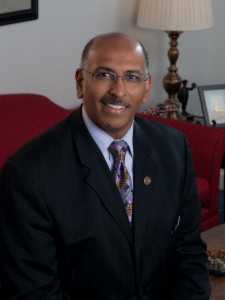 In a speech before the 2008 Republican National Convention, I unveiled the “Drill Baby Drill” battle cry to reduce our nation’s dependency on foreign sources of oil and to encourage more domestic oil exploration and increase oil refining capacity. In a speech before the 2008 Republican National Convention, I unveiled the “Drill Baby Drill” battle cry to reduce our nation’s dependency on foreign sources of oil and to encourage more domestic oil exploration and increase oil refining capacity.
However, since the 2008 election, our nation remains dependent on foreign petroleum sources while the Obama administration continually blocked exploration and drilling which in turn would have helped lower the cost of gasoline.
Once the long-awaited State Department’s final environmental analysis of the $5.4 billion Keystone XL oil pipeline was announced, its positive report increased pressure on President Barack Obama to approve the 1,700-mile Canada-to-Texas pipeline. The fact that experts say the pipeline would ultimately employ about 20,000 Americans while working to achieve the bipartisan goal of energy independence makes not approving the pipeline a bit problematic for the president when the economy is still growing jobs at an anemic pace.
Release of the report has triggered a 90-day review period so Americans will know within that time frame whether the president is serious about immediate job creation and ultimate energy independence.
Politically, Keystone XL is supported by leading Republicans, Democrats and some of America’s largest labor unions. However, environmental progressives, a core constituency of the Obama political base, are promising acts of “civil disobedience” if the president signs off on the project and, in their eyes, undermine their “green agenda.”
Others, like former President Jimmy Carter have warned President Obama he risks standing on the wrong side of history should he approve the Pipeline. “You stand on the brink of making a choice that will define your legacy on one of the greatest challenges humanity has ever faced – climate change.”
But for all of the dire predictions and threats of political retribution, it is particularly noteworthy that more Democrat members of Congress, particularly the Senate, are finding their voice in support of the pipeline. As recently as last week, eleven U.S. Senators sent a letter to the President asking approval of the Keystone Pipeline by May 31st.
The letter was written by Sens. Heidi Heitkamp of North Dakota and Mary Landrieu of Louisiana and co-signed by Sens. Mark Begich (D-Alaska), Mark Pryor (D-Arkansas), Joe Manchin (D-W.Va.), Joe Donnelly (D-Ind.), Claire McCaskill (D-Mo.), Mark Warner (D-Va.), Jon Tester (D-Mont.), John Walsh (D-Mont.) and Kay Hagan (D-N.C.).
In it, the Senators pleaded “The time to act is now Mr. President. Please use your executive authority to expedite this process to a swift conclusion and a final decision so that we can all move forward on other energy infrastructure needs in this country. We ask that you bring this entire process to an end no later than May 31, 2014, and that your final decision be the right one, finding that the Keystone XL pipeline is in the national interest.”
Read the rest of…
Why Obama needs to ‘Build Baby Build’ the Keystone XL pipeline
By Michael Steele, on Wed Apr 2, 2014 at 10:00 AM ET Awesome piece by Roger Simon in today’s Politico on recovering politician Michael Steele:
Steele, who is a resident fellow at the university’s Institute of Politics, manages to traverse the entire breadth of the Midway before the inevitable happens: A passing car comes to halt, and the driver lowers her passenger window and hails Steele as an old friend, even though they have never met.
While Steele was once the (first black) lieutenant governor of Maryland and the (first black) chairman of the Republican National Committee, today he is far better known than he was then. This is largely due to the airtime he gets as an MSNBC analyst and his appearances on “Real Time with Bill Maher” and “The Colbert Report.”
He is outgoing, bright, magnetic, recognized on streets and in airports and is the one thing he was not while he ran the Republican Party: popular.
“I am the most misunderstood man in politics,” Steele tells me.
Steele was elected to a two-year term as Republican Party chairman on Jan. 30, 2009. It seemed like a good idea at the time. Barack Obama had moved into the White House, and a lot of people were talking about a “post-racial” America. Nancy Pelosi was running the House, Harry Reid was running the Senate and it didn’t seem as if the Republican message was selling all that well.
So maybe it was time for a change.
Except Steele’s election took six ballots and, though Steele had conservative Republican credentials, the reaction of some of the party kingpins ranged from displeasure to dismay. And then there was the race thing. Maybe the country was not so post-racial after all.
“After I was elected chairman, there were some people who refused to shake my hand,” Steele says of some Republican bigwigs.
He was a different kind of chairman. He got involved in controversies that earned him the wrath of Sen. John McCain (not that hard a thing to do, actually) and made a series of statements that some found baffling.
He said the war in Afghanistan was a war “of Obama’s choosing” and that he was going to tell local Republican chairmen, “Don’t think this is a country club atmosphere where we sit around drinking wine and eating cheese and talking amongst ourselves. If you don’t want to drill down and build coalitions to minority communities, then you have to give that seat to someone who does.”
Some of his ideas were actually pretty good. He said he wanted an “off the hook” public relations offensive to reach out to “the young, Hispanic, black, a cross section” and apply party principles “to urban-suburban hip-hop settings.”
This earned him the wrath of Rush Limbaugh, which could be considered a badge of honor, but Steele was the chairman of the Republican Party, a party that didn’t actually think of itself as being that “off the hook.”
Click here to read the full piece.
By Michael Steele, on Tue Mar 11, 2014 at 10:00 AM ET By all accounts the gathering of grassroots conservatives for the American Conservative Union’s CPAC event in Prince George’s County, Maryland offered the right mix of hot rhetoric and new faces; reflection and assessment.
CPAC is often a good way to get a sense of the state of the conservative movement but more important, the state of its relationship with the Republican Party.
For many conservatives, that’s a tenuous relationship on a good day. As Erick Erickson, co-founder of RedState.com, noted, “I think CPAC is really RPAC these days and is as much, if not more, lobbyist oriented than grass-roots oriented. It is like church homecoming for the Republican Party.”
As the weekend proceedings wrapped up with a rousing call-to-arms by former Alaska Governor Sarah Palin, some basic questions remain for a movement in transition: Coming into the 2014 elections, are conservatives gaining strength or treading water? And how does any of this really translate to the rest of the country?
Polls show political conservatism is still very healthy despite liberal wailing to the contrary. In terms of electoral politics the conservative base and liberal base basically cancel each other out, with each side striving to reach enough independents in the political center to win nationwide or statewide elections. So, for the most part, it’s a draw.
But some of the polling of the CPAC attendees also reveals some interesting challenges and opportunities for conservatives. For example 41 percent believe marijuana should be legalized and taxed for recreational and medical use (21 percent believe marijuana should be legalized only for medical purposes when prescribed by a doctor) while 31 percent say it should remain illegal.
 Similarly, 78 percent cite their most important goal is to promote individual freedom by reducing the size and scope of government, while only 12 percent cite promoting traditional values by protecting traditional marriage and protecting the life of the unborn as their most important goal. Such findings are consistent with the libertarian leanings of the participants (46 percent of whom were between the ages of 18-25) but also are a sign of a changing demographic within the conservative movement itself. Similarly, 78 percent cite their most important goal is to promote individual freedom by reducing the size and scope of government, while only 12 percent cite promoting traditional values by protecting traditional marriage and protecting the life of the unborn as their most important goal. Such findings are consistent with the libertarian leanings of the participants (46 percent of whom were between the ages of 18-25) but also are a sign of a changing demographic within the conservative movement itself.
While themes of freedom, faith and family were echoed throughout the weekend, speaker after speaker seem to have in mind those changing demographics inside and outside the hall as they came repeatedly back to strategy and what it will take to win in 2014.
Former Speaker Newt Gingrich cautioned “we must stop being the opposition movement, and we must become the alternative government movement that will help make the life of every American better so that they understand what we would do that would be right, not just what the left is doing that is wrong.” U.S. Senator Ted Cruz (R-Tx), a Tea Party favorite, urged conservatives to stick with core beliefs to win elections. “They say if you stand for principles, you lose elections. That is a false dichotomy.”
Governor Chris Christie (R-N.J.), insisted conservatives embrace a governing agenda that would help Republicans succeed this November and beyond. “We don’t get to govern if we don’t win. So please, let us come out of here resolved not only to stand for our principles, but let’s come out of this conference resolved to win elections again.”
And it is winning elections that has proven elusive since 2011. The lack of a cohesive message to voters, struggles over the “conservative brand” with its Tea Party base and the poor standing of the Republican-controlled Congress have all taken their toll (for example, 51 percent of CPAC attendees disapprove of the Republican Congress).
But many conservatives, like Sen. Cruz, feel in the end the failure of 2012 GOP presidential candidate Mitt Romney to effectively draw stark contrasts between his governing policies and the Obama agenda stands as an example of watered-down conservatism. As the Senator would make clear in his speech, “All of us remember President Dole and President McCain and President Romney — now look, those are good men, they’re decent men, but when you don’t stand and draw a clear distinction, when you don’t stand for principle, Democrats celebrate.”
But it would be another Tea Party favorite, Senator Mike Lee (R-Utah), who would warn against purging centrist Republicans, saying, “we as conservatives have got to be far more engaged in finding converts than in discarding heretics.” Senator Rand Paul (R-Ky.) drove the point even deeper. “You may think I am talking about electing a Republican. I am not,” Sen. Paul said. “I am talking about electing lovers of liberty. It isn’t good enough to pick the lesser of two evils. We must elect men and women of principle, and conviction and action that will lead us back to greatness.”
Senators Lee and Paul are closer to the truth for both conservatives and the Republican Party: It is a false choice we sometimes make between core principles and good governance.
But many conservatives stand on the precipice of conservatism, ready to throw each other off because of such false choices; feeling they have lost their grip on what conservatism means and who is best positioned to articulate it.
As conservatives and Republicans assess their leadership, their strategy and ultimately the impact they will have on American politics in 2014 and beyond, they would be wise to heed the advice of the late conservative icon William F. Buckley Jr.: “Nominate the most conservative candidate who is electable.”
By Michael Steele, on Tue Jan 21, 2014 at 10:00 AM ET When I think of Dr. King, I think of his courage, vision, strength, humanity, and most importantly, his perseverance. Dr. King’s perseverance transformed him into a legendary leader but it was his challenge to each one of us that sets him apart—a challenge in this day, in this hour, to “take up the cause of freedom”.
This element of Dr. King’s life is something that hopefully each of us has incorporated into our daily lives. Perseverance breeds success; and it is his perseverance that enabled Dr. King to achieve his dream.
Dr. King knew that his dream—this movement towards civil rights—would begin a new chapter for America—a chapter we are still writing today; a chapter steeped in the hopes of “little black boys and black girls [joining hands] with little white boys and white girls” for true opportunity and equality.
 We celebrate this day different from any other American holiday because we use it not only to recall the legacy of the civil rights era and the man who lived and died for the true freedom of all Americans, but also to assess how we are doing in making The Dream real. Like Dr. King, we are not just writing a chapter in the life of the African-American community, we are the authors of the book of life in America. We celebrate this day different from any other American holiday because we use it not only to recall the legacy of the civil rights era and the man who lived and died for the true freedom of all Americans, but also to assess how we are doing in making The Dream real. Like Dr. King, we are not just writing a chapter in the life of the African-American community, we are the authors of the book of life in America.
I know that if Dr. King were here today he would encourage us to persevere in the face of tragedies like the Trayvon Martin shooting, or efforts to roll back hard fought gains in voting and civil rights. He would remind us that “freedom is not free” and the price we must pay keeps the dream alive; that success does not come without sacrifice if you want the dream to live for future generations
And that’s the easy part because the dream lives in each one of us. Happy Birthday Dr. Martin Luther King, Jr.
(Cross-posted, with permission of the author, from The Grio)
By Michael Steele, on Fri Dec 6, 2013 at 11:00 AM ET Imprisoned for 27 years because he fought to be equal and free, a man can become bitter, even angry at his jailers and the oppressors they represent. But as Nelson Mandela recalled “As I walked out the door toward the gate that would lead to my freedom, I knew if I didn’t leave my bitterness and hatred behind, I’d still be in prison.”
For the Mandela family, their loss is personal, but it is a loss shared by a world that has been touched by the quiet strength and fearless determination of Nelson Mandela. While we mourn with them and the people of South Africa, we also celebrate with them the life of a great man.
God blesses us with the precious gift of life. What we do with that gift is the legacy we leave behind.
And what a legacy Mandela has left for us.
He empowered generations of South Africans not just to dream but to do. His vision of equality became a reality for them and a galvanizing force for change for the rest of us.
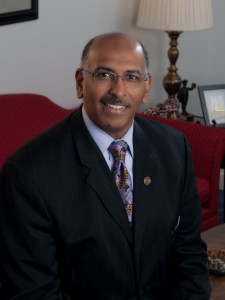 Today, South Africa stands taller because it stands on the shoulders of Nelson Mandela. Today, South Africa stands taller because it stands on the shoulders of Nelson Mandela.
It is freer because he never wavered in his core belief in the advancement of equality and freedom for its people.
And it is richer because he believed in its possibilities. As Mandela once said “Never, never and never again shall it be that this beautiful land will again experience the oppression of one by another.”
Well done good and faithful servant. Rest in peace Madiba.
(Cross-posted, with permission of the author, from The Grio)
By Michael Steele, on Thu Nov 21, 2013 at 1:30 PM ET Iraqi Prime Minister Nouri al-Maliki met with President Barack Obamain Washington on November 1st, and leading up to his visit, White House press Secretary Jay Carney put his best diplomatic smiley-face on it by noting “the visit will highlight the importance of the U.S.-Iraq relationship under the U.S.-Iraq Strategic Framework Agreement (SFA),” and that Obama “looks forward to discussing with Prime Minister Maliki efforts to enhance cooperation in the fields covered under the SFA, and to coordinating on a range of regional issues.”
Of course, after the two-hour meeting, President Obama remarked, “The United States wants to be a strong and effective partner with Iraq.” No doubt. Maliki came seeking more weapons and the president sought a “strong and effective partner.” While this face-to-face meeting may have served to raise Maliki’s diplomatic profile, in the eyes of many it diminished the profile of the United States and its professed commitment to justice, human rights, and international law. The president should have refused this meeting.
No one should doubt, least of all Prime Minister Maliki, that he owes his position to the United States, which sacrificed its blood and spent billions of its treasure to pave his way to power. But Maliki’s failure to be a true partner with the U.S. and his cozy relationship with Iranian President Hassan Rouhani, as well as his recent actions, have created more problems than solutions for the United States.
On September 1, 2103, at the apparent request of the Iranian Mullahs and on the orders of Nouri al-Maliki, Iraqi security forces attacked and killed 52 Iranian refugees (and kidnapped seven, including six women) at Camp Ashraf in eastern Iraq.
Camp Ashraf was settled more than 25 years ago by 3,400 members and sympathizers of the principal Iranian opposition known as the People’s Mojahedin Organization of Iran (PMOI/MEK). The U.S. military disarmed Ashraf City in 2003, and in 2009 turned over control of the camp to the Maliki government in Baghdad. At that time, the United States assured residents of Ashraf City that the Iraqi government would treat them humanely in accordance with international law. As refugees, members of the opposition and their families are protected persons according to the Fourth Geneva Convention, and should not be subject to harassment, much less kidnapping and murder by the military forces of Iraq.
Last year, some 3,000 residents of Camp Ashraf were forcibly transferred to Camp Liberty, near Baghdad. 52 of those remaining at Camp Ashraf would meet a different fate.
In the attack, most of the murder victims were handcuffed, identified, and then executed with a bullet to the head, according to a statement by the UN Assistance Mission in Iraq. Some were slaughtered in Ashraf clinic where they had been taken for medical treatment. All of these individuals had signed an agreement in cooperation with the United States, which had guaranteed their safety and protection until their final relocation. The U.S. failed to keep its word.
While the United States, the UN, the European Parliament, and Amnesty International all condemned the massacre and kidnapping, world leaders have been hesitant to affix responsibility, particularly in the face of reports of “coordination” between the Maliki and the office of Iranian Supreme Leader Ali Khameini.
As Congressman Dana Rohrabacher (R-CA), Chairman of the House Foreign Affairs Subcommittee on Europe, Eurasia and Emerging Threats noted in a statement, “The Iraqi military is murdering unarmed refugees, and there is every reason to believe Prime Minister Maliki, at the behest of the Iranian Mullahs, ordered these criminal acts. Come what may, Maliki will be held responsible for this reprehensible slaughter of civilians in his own country.” Likewise, Senator Robert Menendez (D-NJ), Chairman of the Senate Foreign Relations Committee made clear “I hold the Iraqi government directly responsible to protect the community, to investigate this matter thoroughly, and to prosecute the perpetrators of this heinous act.”
Which makes Maliki’s visit to the White House that much more problematic.
For Maliki, the man whose cooperation with the Iranian clerics was crucial to carrying out this atrocity, to enjoy the prestige of a personal meeting with President Obama is totally unacceptable. For many Americans, let alone Iranians, Maliki has clearly betrayed the trust that the United States displayed in him; and has undermined the very safety and security the United States had promised to those refugees.
No political consideration or calculus to compel Maliki to release the hostages is immoral, misguided, or unacceptable. The lack of meaningful action by the U.S. in support of the hostages and the failure to hold accountable those who slaughtered 52 men and women is inexcusable.
Maliki’s visit presented the perfect occasion for President Obama to honor the commitment made to protect the refugees now at Camp Liberty; a commitment that can only be ensured by moving the refugees out of harm’s way and returning them to their homes.
Moreover, the visit afforded the president the opportunity to make it clear to Maliki that there will be no more U.S. aid, no more arms sales and no further political support unless the 7 refugees taken hostage at Camp Ashraf are released and full protection is provided for the 3000 refugees at Camp Liberty. At least that’s what a “strong and effective partner” would have done last Friday.
(Cross-posted, with permission of the author, from TheGrio.com)
By Michael Steele, on Tue Oct 29, 2013 at 10:00 AM ET With so many of the civil rights battles behind us, and the satisfaction that comes from the success of African-Americans in business, politics, sports and entertainment, it is no surprise that the assault upon the integrity and historic purpose of our nation’s Historically Black Colleges and Universities (HBCU) has been little noticed by mainstream media and, more sadly, the black community itself.
Not only do our HBCUs stand as a testament to the challenges that lie in the future but they are an important reminder of the proud history of African-American education in America and its unlimited potential.
Across America, HBCUs are giving African-Americans the tools and the knowledge they need to fully participate in our society, to build a solid economic foundation on which to raise their families and their businesses, and to become leaders of the future.
However, many of those tools had begun to be stripped away and much of that foundation began to crumble under the weight of neglect and institutional bias. Maryland HBCUs (Bowie State University, Coppin State University, Morgan State University and University of Maryland Eastern Shore) were treated no differently.
In October 1999, the State of Maryland and the United States Department of Education, Office for Civil Rights (OCR), entered into a partnership for the purposes of improving the educational opportunities for African Americans in Maryland’s public institutions of higher education and of ensuring compliance with the state’s obligations under federal law. The partnership agreement set forth the commitments that the state and OCR anticipated would bring Maryland into full compliance with its obligation under Title VI of the Civil Rights Act of 1964.
 But as the partnership agreement expired in December 2005, it was very clear that while the state had met the letter of the law under Title VI (and its agreement with OCR); embracing the spirit of such agreements would be another matter. In practice, Maryland’s HBCUs had to deal with the growing reality of “duplication of specialized programs” whereby certain resources (e.g. laboratories and libraries) or academic programs (e.g. MBA) were duplicated at predominantly white institutions, resulting in HBCU students having to go to those institutions to access them. But as the partnership agreement expired in December 2005, it was very clear that while the state had met the letter of the law under Title VI (and its agreement with OCR); embracing the spirit of such agreements would be another matter. In practice, Maryland’s HBCUs had to deal with the growing reality of “duplication of specialized programs” whereby certain resources (e.g. laboratories and libraries) or academic programs (e.g. MBA) were duplicated at predominantly white institutions, resulting in HBCU students having to go to those institutions to access them.
As Lt. Governor of Maryland, I became acutely aware of the failure of so many to do just a little to help our state’s HBCUs. But the supposed innocuousness of program duplication only masked the knife cutting away the ability to improve access to these fine institutions and to create opportunities for them to compete with the state’s majority white institutions.
Read the rest of…
Michael Steele: Why HBCUs are Hanging by a Thread
By Michael Steele, on Tue Oct 22, 2013 at 10:00 AM ET Look ma, no federal government!
At some point the entire BS that is the government shutdown sinks in and we have to deal with reality: We have elected a bunch of children to run our government.
One reality that must not change about America and the free enterprise economy is that the root of America’s success has always sprung out of the hard labor of its entrepreneurs: the men and women who risk it all on a dream. Government doesn’t do that; government can’t do that. When a job is created by a small business owner they make an investment in people in a way that government can’t match. So when those same business owners have legitimate concerns about government policies that affect them, elected officials must listen in order to preserve the conditions that allow small businesses to thrive.
 The fact that politicians in Washington have lost sight of that tells me we can longer trust them to do this by themselves. Each one of us must be prepared to help set the nation’s priorities for the immediate future. We must decide what price we’re prepared to pay for a strong national defense and better schools; how much are we truly ready to spend for our children’s healthcare and to secure our nation’s borders? Which programs are we prepared to cut in order to get our financial house in order, and by how much? While these are difficult questions, they are not either/or choices, but rather complementary opportunities. The fact that politicians in Washington have lost sight of that tells me we can longer trust them to do this by themselves. Each one of us must be prepared to help set the nation’s priorities for the immediate future. We must decide what price we’re prepared to pay for a strong national defense and better schools; how much are we truly ready to spend for our children’s healthcare and to secure our nation’s borders? Which programs are we prepared to cut in order to get our financial house in order, and by how much? While these are difficult questions, they are not either/or choices, but rather complementary opportunities.
The White House and the Congress need to take a time out from the silliness of politics and the drama of blaming one or the other for shutting down the government—both political parties, the White House and Congress are to blame. Stupid lives at both ends of Pennsylvania Avenue in this mess.
Read the rest of…
Michael Steele: We Have Elected a Bunch of Children to Run Our Government
By RP Staff, on Mon Oct 7, 2013 at 10:00 AM ET 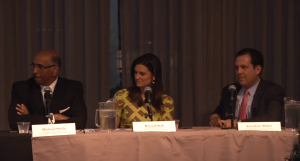 Crisis management and scandal recovery have captured the moment, from big-league sports to New York City’s current political silly season. PR firms are rebranding themselves as crisis advisers. Ex-White House aides are peddling their bona fides. While the public sees scandal through a tabloid lens, at its heart are flawed human beings making mistakes, acting emotionally, and trying to preserve their reputations and careers. “Recovering politicians” who suffered highly publicized scandals share their stories, offer guidance, and comment on the latest attempts to launch second acts. Crisis management and scandal recovery have captured the moment, from big-league sports to New York City’s current political silly season. PR firms are rebranding themselves as crisis advisers. Ex-White House aides are peddling their bona fides. While the public sees scandal through a tabloid lens, at its heart are flawed human beings making mistakes, acting emotionally, and trying to preserve their reputations and careers. “Recovering politicians” who suffered highly publicized scandals share their stories, offer guidance, and comment on the latest attempts to launch second acts.
A conversation with:
Krystal Ball, co-host, MSNBC’s “The Cycle;” former Virginia congressional candidate
Jonathan Miller, Daily Beast columnist; No Labels co-founder; former Kentucky state treasurer
Michael Steele, co-chairman, Purple Nation Strategies; former Republican National Committee chairman
Moderated by:
Jeff Smith, assistant professor of politics and advocacy, The New School; former Missouri state senator
|
|
 The untreatable international agita over Russia’s meddling in Eastern Ukraine is taking on otherworldly overtones here in the United States, where the Putin regime’s hegemonic bullying of its next-door neighbor is reaping unforeseen cosmic repercussions in the heavens, in the halls of diplomatic and military power, and in the courts.
The untreatable international agita over Russia’s meddling in Eastern Ukraine is taking on otherworldly overtones here in the United States, where the Putin regime’s hegemonic bullying of its next-door neighbor is reaping unforeseen cosmic repercussions in the heavens, in the halls of diplomatic and military power, and in the courts.








